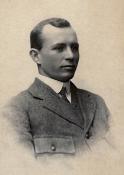
|
The King's School Canterbury |
Roll of Honour |
| 2nd Lieutenant Arthur Cuthbert LOCK | |
|
Indian Army Reserve of Officers attached to 104th (Wellesley's) Rifles Date of birth: 16th August 1887 Date of death: 1st August 1916 Died aged 28 Buried at Baghdad North Gate Cemetery Plot XXI Row P Grave 4 |

|
| He was born at 30 Queen's Square in London on the 16th of August 1887 the third and youngest son of His Honour Judge Benjamin Fossett Lock and Jane Elizabeth (nee Hammond) later of The Toft, Bridlington in Yorkshire. He was christened at the Church of St George the Martyr, Queen's Square London on the 14th of June 1892. He was educated at at Mr E.T. Bull's Preparatory School, and at the King's School Canterbury from September 1900 to July 1904 where he was in the Rowing IV in 1904. He went on to the University of London. On leaving university he left for India to become an indigo planter. On the outbreak of war he was manager of a large estate at Morarpur, Behar in Bengal and had announced his engagement to Miss Edith Dorothy Robson on the 29th of December 1914. They were due to be married at Hull but this was postponed for his war service. He had long been a member of the Behar Light Horse, rising to Sergeant in the Motor Transport Section, due to his engineering skills, and went to Mesopotamia as part of the Indian Expeditionary Force in August 1915. While attached to General Townsend's headquarters he volunteered to drive a motor boat on the River Tigris and arrived at the headquarters just before the Battle of Ctesipion. In his last letter he described how he was occupied by taking soundings in his light draught boat in order to test whether the other boats in his section would be able to get closer to Baghdad. During the siege of Kut he was commissioned into the Indian Army Reserve of Officers as a 2nd Lieutenant and was attached to the Indian Army where he served with 104th Wellesley's Rifles, part of the 6th Indian Division. He was slightly wounded in March 1916 but recovered well. When Kut fell on the 29th of April 1916 he was taken prisoner and was marched for two months through Asia Minor by the Turks and was interned at Kastamuni. Despite receiving good treatment from his captors and writing cheerfully up until the 20th of July, he died unexpectedly at Kastamuni. He was mentioned in despatches. |
|
| School House |
Back